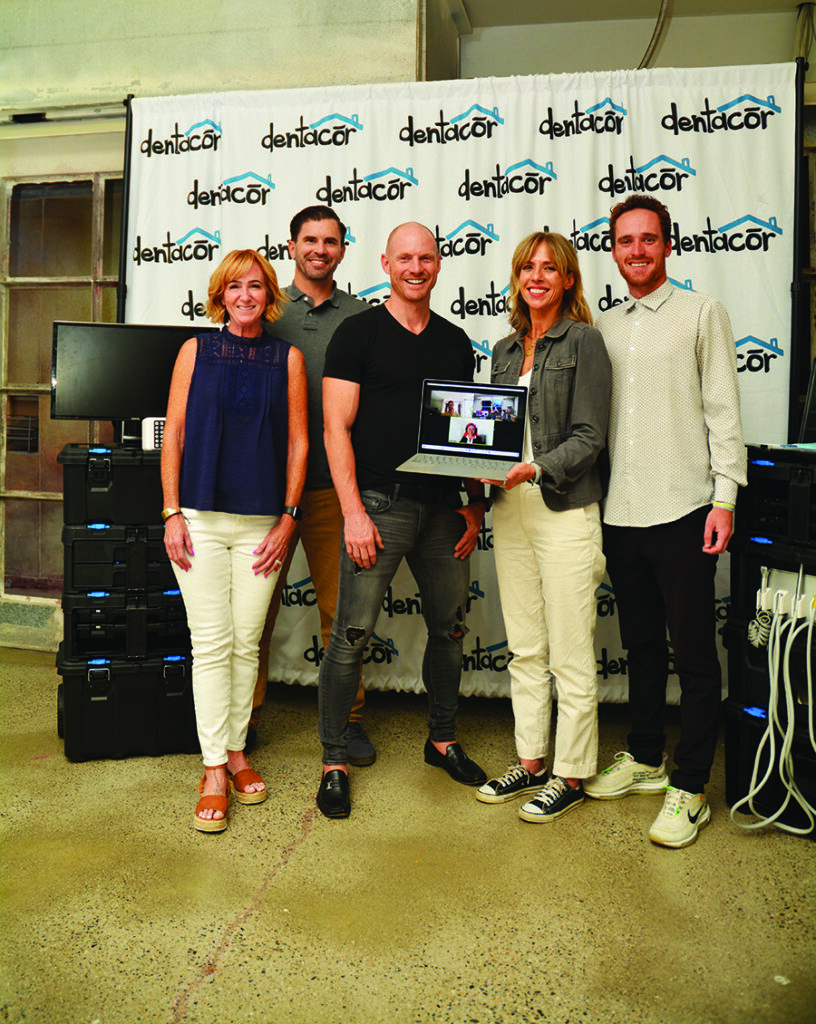
Telehealth? Online therapy? In an era obsessed with “virtual” and “remote,” dentistry has been understandably slow to follow the trend. The team at Dentacor in Lehi saw an opportunity to transform the world of dental.
With only 50 percent of Americans getting semi-annual dental exams, and $45 billion of productivity loss every year in the dental world due to untreated dental disease, Dentacor looks to bring cleaning and exams to the home.
“Our core is to make dental exams accessible for everyone — whether you work or are a stay-at-home mom with five kids or have no money,” says Pam Sitterud, co-founder.
That’s the core of Dentacor.
A while ago, I (Pam) realized I hadn’t been to the dentist in seven years — and it had been four years since my kids had gone. When we went, we expected it to take an hour and a half, but the visit turned into three hours. My son had 14 cavities, which seemed excessive. I sent a friend in the dental field the X-rays and he said, “He actually only has six cavities.”
This friend, Dr. Dax Rapp, a pediatric dentist, shared that years ago he had come up with a business model of how to create transparency and convenience in the dental industry. About six months later, we opened Dentacor based on his model.
The way it works is that Dentacor goes to a company’s headquarters and does dental exams for employees right there at their offices. Then our team schedules times to go to employees’ homes to do dental exams for the rest of the family. A dental hygienist and dental assistant take X-rays and clean each person’s teeth. Then, those images go virtually to dentists we have on staff at Dentacor. The dentists diagnose and develop a treatment plan, just like in a dental office. If someone needs major care, we connect the patient with a local dentist.
The diagnosing dentists at Dentacor are never the treating dentists, so it eliminates the incentive to exaggerate necessary care. This creates a checks-and-balances system.
The vision for the company has to do with focusing on cleanings and exams — the least profitable treatments in brick and mortar dental offices.
With Dentacor, dentists can focus on major care like fillings and extractions, which means dental office revenue can increase by about 200 percent.
As we researched, we noticed a lack of care for groups that really need it — low income, immigrants and those experiencing homelessness.
If people don’t get regular oral care, their chances of heart disease, cancer and diabetes dramatically increase. We created “Cor Community,” where dentists volunteer to take care into areas like the homeless youth center and addiction centers.
These kids at the youth homeless shelters have been through hell. We remember one young man who left smiling after we gave him a normal exam.
Someone at the resource center told us a bit about this boy who had been there for six months. She said, “The first time I ever saw him smile was when he walked down the stairs after getting his teeth cleaned. The very next day, he was with a group of people in the facility, talking and laughing, and this was the first time I’ve ever seen him have a conversation with anybody.” About a month later she said he had found housing and got a job for the first time in years. We’re not saying that’s because of Dentacor, but it’s amazing to help someone feel seen.
When someone can feel like they’re worth smiling and getting taken care of, that’s what makes it worth it. That’s our stewardship. We do our best to take care of others. Leadership can only be true when we own ourselves and love others.
Before starting two years ago, we really had no idea it would evolve into something like this, but it’s so much more beautiful than we ever anticipated, and we’re so honored to be a part of it.
“We hope Dentacor will help revolutionize the dental industry itself,” says Pam Sitterud, co-founder. “We’re trying to take dentistry back to being patient-centric. We want to close the gap for Americans who haven’t been to dentists in the last two years.”